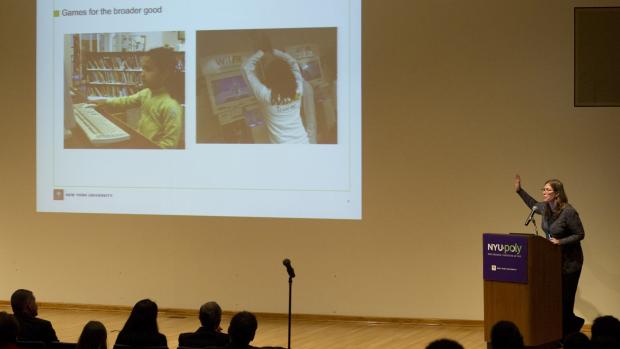What’s Next for the i²e Campus Transformation? Updates on In-Progress and Upcoming Initiatives Shared at Town Hall

Just one and one-half years into the Polytechnic Institute of New York University’s 10-year i2e Campus Transformation, a Town Hall held on February 8 provided a snapshot of the fast pace and vast scope of related projects that are in progress and those that are still to come.
The projects support the key strategies of the $38-million capital plan approved by the Institute’s board of trustees last October: 1) renovate Rogers Hall, 2) expand into MetroTech Center, 3) focus on entrepreneurial development opportunities, and 4) allocate for ongoing asset improvements.
“The primary goal of the campus transformation is attracting and retaining the best faculty and the best students to our institution,” said NYU-Poly President Jerry M. Hultin. “Faculty need great spaces to do research and teach; students need great spaces in which to explore, connect, and innovate. That’s why we’ve been doing these projects.”
Among in-progress projects highlighted were NYU-Poly’s potential expansion into leased space in MetroTech Center to accommodate faculty offices, dry labs, small classrooms and administrative functions. The move would free up space for new faculty, allow for renovation of current facilities, and give the Institute a bigger presence around the central square.
Dennis Dintino, vice president of finance and business affairs, also made the financial case for moving into MetroTech Center, citing the recent assessment of facilities which concluded that a full-scale renovation of the Jacobs Administration Building would require a $48-million investment. “Instead, we can move into a MetroTech building for substantially less – from $22 to $28 per square foot,” he said, describing current real estate market conditions that have yielded favorable long-term lease rates.
Also at the Town Hall, Dr. Katherine Isbister previewed another in-progress initiative – the Center of Innovation for Technology and Entertainment (CITE), funded by a $2-million grant from the State of New York, and provided a glimpse into the innovative research and teaching approaches the new center will foster when it opens officially in March.
“Games present a wonderful opportunity to teach inter-disciplinary teams,” said Isbister, associate professor of computer science and engineering and humanities and social sciences, and research director of CITE’s Game Innovation Lab. “Designers, electrical engineers, programmers – they all need to work together in a collaborative environment.”
Other projects in progress are: the extensive 1st and 4th floor restroom renovations in Rogers Hall, slated to be completed by the end of February; and PolyPods, flexible furniture groupings that will facilitate impromptu collaborations, to be installed throughout the campus this spring.
Finally, Town Hall presenters touched upon future transformation initiatives, including an opportunity for NYU-Poly to participate in the construction of a new, inter-disciplinary facility being proposed by New York University along Manhattan’s First Avenue Health Sciences Corridor. The state-of-the-art building would extend the reach of NYU-Poly’s planned new Bio-Engineering department beyond Brooklyn. Also on the horizon are: Rogers Hall renovations to upgrade labs for new faculty hires, address some interim issues in existing labs, and create additional academic spaces; the planning for the proposed re-development of the Jacobs Administration and Civil Engineering building sites; ongoing asset improvements in the Dibner and Wunsch buildings; and the development of a comprehensive Climate Action Plan.




